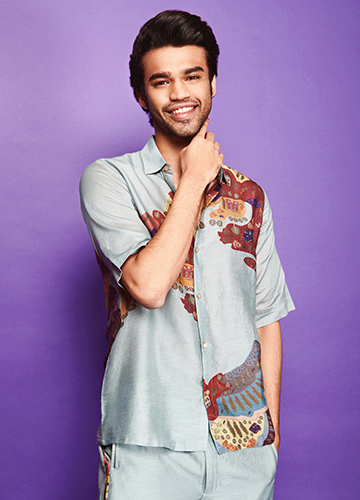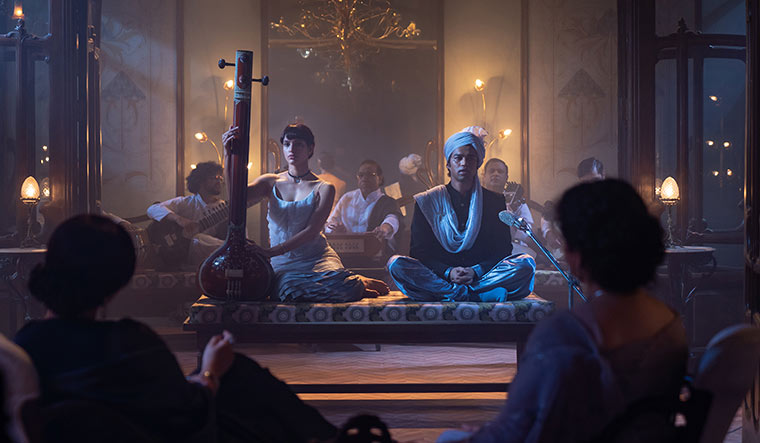Freed from the encumbrance of expectation, away from the spotlight and beyond the need to conform, Babil Khan would rather be just Mowgli.
We shall return to that desire.
Over a month ago, Khan was first seen on screen as a brilliant but doomed singer in the film Qala (Netflix). For the larger part of the film, his is the absence that is its strongest presence. He has just a few spoken lines, but the spooky-snarky manner in which he delivers two words, “Chal jhooti [Come on, liar]”, to the film’s eponymous character lives on beyond the movie’s defining deaths.
Khan, 24, has a profound way with words. For an actor, words are armour. Dialogue can compensate for the missing subtlety in expression. For someone just starting out, words are refuge.
But those were not the thoughts that crossed Khan’s mind when the part came to him.
“I was not thinking about whether the role would make me look good, I was not strategising… just extremely excited to be a part of Anvita’s (Dutt, the director) world. I knew that I did not want a lead role. In a supporting act, I could be part of the process, without it (the film) being about me,” he says.
The last seems dissonant when you are the son of one of the country’s best loved talents–the late Irrfan Khan, who impressed filmmakers and audiences beyond borders. It also seems strange in these times when ‘debuts’ trump films.
Without deprecating ‘star-kids’, Khan does not consider himself one. “Baba was an actor first. He became a star after 30 years of hard work and dedication. We (brother Ayaan included) were not exposed to his popularity or wealth,” he says.
Growing up, Khan was a boy who would hop onto a rickshaw from his home at Madh island, take the ferry to the mainland (Mumbai), and get on an auto-rickshaw to reach his tuition classes in the suburbs.
Yet, he is acutely aware of the privilege he comes from. His mother, Sutapa Sikdar, is a writer and a producer. Someday, the debate about nepotism might creep up on him. “I can never take [the privilege] for granted. I need to give it my absolute best… people should be moved [by my performances] in some way. I am terrified of letting down baba’s fans,” he says. And thus, he is auditioning, and getting rejected.
“It hurts so much when I do not do well… for I have let baba down. But these are the insecurities of the journey. Rejections and downfalls are extremely important to understand what is not working. I am fortunate to get rejected. I will not be able to handle it if people cast me just for being baba’s son. That would break me down,” he says.
Khan’s first role (he hates the word ‘debut’) has earned him rapturous reviews. He is extremely self-critical, but is also aware that in that moment, that was how art was to be organically created.
For the longest time, he had denied the “furiously” growing desire to be an actor. He was studying for a bachelor’s degree in films at the University of Westminster in London, with a specialisation in cinematography. As part of the admission process he had written two scripts. For the course, he wrote essays and a dissertation on the essence of spirituality in Russian filmmaker Andrei Tarkovsky’s films. Six months before the end of the course, there was a tipping point.
Khan was the camera operator for a fellow student’s film. An “experienced” actor was performing, but without heed to the director’s instructions. “Every actor has his own way, but this one was just not listening to the director, especially when it was her degree at stake.” So Khan switched off the camera, went in front of it and demonstrated the desired expression. For that act, he got thrown out and soon after, he quit the course. He told his father, “Spending every second in film school behind the camera is agitating me.” The senior Khan sighed, realising that his first-born had set himself up on a path where every career marker would start as a comparison.
Khan still got his degree though, ‘with merit’ at that, for he had earned enough credits in his time at the course.
After the senior Khan’s death in April 2020, his son lost a friend with whom he could have conversations with like no other. The texture of grief is, however, gradually changing. “Earlier, his loss would paralyse me, leave me helpless. Now I am moving from memories of pain to those that celebrate his life,” he says.
Like his baba, he is trying to be his own man. This is visible on social media where Khan treads tricky territory. He once talked about the farmers’ movement against the now repealed farm laws, acknowledging, “everyone tells me to stay shush, to just watch and move on”. He puts up pictures with face masks and moans about bad breakouts.
The last can be especially dangerous in a visual medium where masculinity is a narrow confine. He acknowledges that it conflicts with the “mass acceptance” that every artiste craves. “Just because I am expressing myself, why should there be questions about my sexuality?” he says. “That (expression) is threatening to the human mind because it needs structure, and when boundaries are shaken, it goes into attack mode.”
But Khan has always been adept at hopping over boundaries. He was in class eight and in a stage adaptation of William Shakespeare’s Comedy of Errors. No one in the audience was laughing though. By the time it was his turn to step onto the stage, his lines had deserted him. And so, as he says, he created something out of “sheer necessity, sheer surrender”. Instead of the burdened speech on melancholy he had to make, he said, “Kya hawa chal rahi hai, bhai” (loosely, ‘what a wonderful breeze, brother’). Laughter erupted and a true comedy was born.
It is that feeling of sheer surrender, that breathing in and letting go of all ideas of oneself, that Khan is afraid, shall abandon him someday. At the promotions of Qala, he was conflicted between the purity of the art and commercial obligations. He found solace in a conversation with famed theatre director Prasanna, who was his father’s mentor.
“A good character is where Mowgli is within me, as is the desire to fulfil the necessity of commerce. I have to find that balance,” he says.
So who is he as Mowgli?
“I have no idea. I don’t want to define Babil. As Mowgli, he is the child running in the jungle, trying to be happy and make people laugh. I just want to stay with that essence. When that gets lost in the rut of all the pretensions of being something else, I get scared.”
That is the undefined Mowgli he would rather be, above and beyond it all.



